Is it possible to introduce cauliflower into the diet while breastfeeding
The diet of a nursing mother in the first few weeks after birth is always as strict as possible. Each product introduced into the diet must be approved by a doctor and guaranteed not to cause health problems in the baby. Vegetables are the first to be introduced on the menu, but nursing mothers treat cabbage of any kind, including cauliflower, with caution, fearing that the baby will have a puffy stomach. However, this has nothing to do with cauliflower - the vegetable is one of the safest and rarely leads to any negative consequences.
The content of the article
Can you eat cauliflower while breastfeeding?
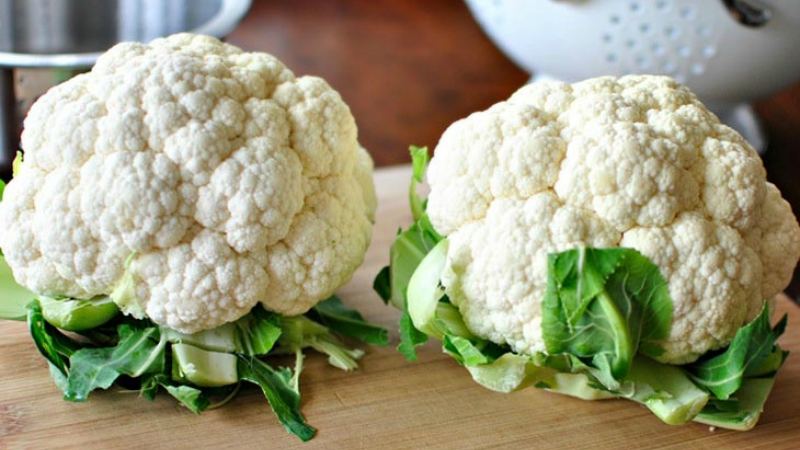
Cauliflower allowed for all lactating women - it is included in the category of foods that can be eaten, even if the child was born with a tendency to allergies.
Doctors do not advise rushing with the introduction of a vegetable into the menu in the first 2-3 weeks after childbirth: until the baby's digestive system is strengthened, it is worth refraining from any cabbage.
Three weeks after giving birth, mother can make herself a soup from mashed inflorescences or stew them with other vegetables. After three months, cabbage in any form, except fried, is allowed to be consumed.
Contraindications
Cauliflower is the safest product, it is often chosen for the first feeding. When breastfeeding, you can eat a vegetable without fear if there is no individual intolerance to the product (for example, constant bloating and discomfort after eating) and a pronounced food allergy in the mother or baby.
Reference. Allergy to cauliflower is rare - and even those cases that have been identified showed a reaction not to the vegetable itself, but to the chemicals that accumulated in it. Therefore, the most important thing is to choose the right product so that it is environmentally friendly and of high quality.
Benefit and harm
Problems for a mother or baby can be when eating a vegetable only if it has been spoiled or grown with the use of pesticides and nitrates. In all other cases, cabbage will only benefit.
For mother
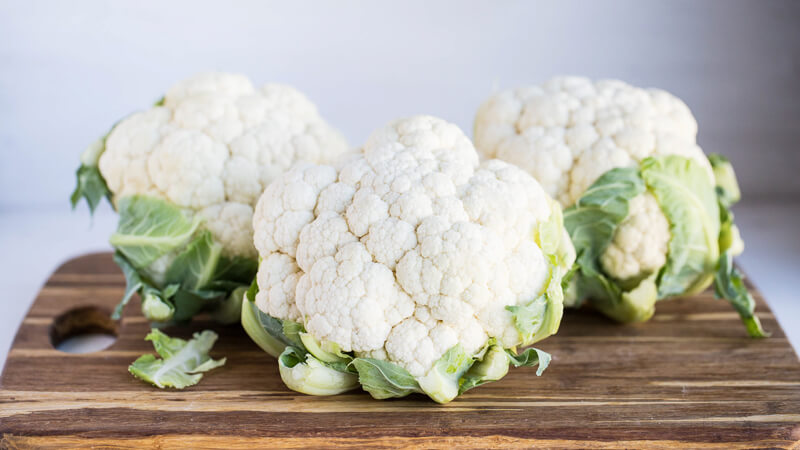
Boiled, steamed or baked inflorescences have the highest nutritional value. They will perfectly fill the lack of vitamins and minerals in the body, depleted by pregnancy and breastfeeding.
The vegetable contains B vitamins, vitamins C, E, K, as well as potassium, magnesium, phosphorus, iron and calcium. The spectrum of useful properties is extensive:
- Fresh cabbage contains flavonoids - substances that increase the body's defenses and are needed for the full functioning of the cardiovascular system. For women who have suffered from high or low blood pressure during pregnancy, the vegetable will be especially useful.
- Cabbage is hypoallergenic - the risk of developing a negative reaction in an infant is practically zero.
- Stewed and boiled cabbage recommended if the mother follows a sparing diet, since the product is easily absorbed and does not irritate the stomach lining. After giving birth, many suffer from constipation - the vegetable is able to completely cope with this problem in a few days.
- If a young mother wants to lose the extra pounds gained during pregnancy, boiled inflorescences will be an ideal helper, since with a high nutritional value they contain only 23 kcal per 100 g.
Cauliflower contains little coarse fiber - only about 2g per 100g fresh vegetable.Fiber is what causes bloating and stomach pain from nursing mothers. Therefore, all other types of cabbage are not recommended in the diet until the baby is 6 months old. Cauliflower is completely safe in this regard.
For a child
Even if the product causes bloating and increased gas formation in the mother, it is not at all a fact that the baby will have the same reaction.
Colic is a normal reaction of a newborn's body to the colonization of the digestive system with bacteria, which it needs in the future to digest food. Most modern doctors do not associate colic with the mother's diet.
Cabbage can slightly affect the baby's stool - making it thinner. Otherwise, most children do not have any negative manifestations.
Rules for use during lactation
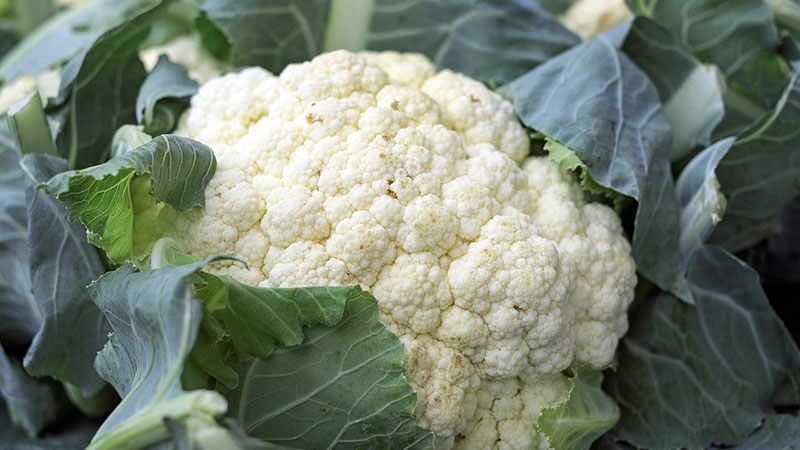
Delicate cauliflower can be eaten fresh, adding a little to salads and soups. But it is tastier and safer for a nursing mother to use it:
- in boiled form;
- baked with a little oil;
- steamed;
- stewed with other vegetables or meat.
During seasonal colds, doctors recommend that young mothers eat about 400 grams of cauliflower per week to maintain immunity.
How and when to introduce into the diet
In the first two weeks after giving birth, you should refrain from any types of cabbage.
After newborns reach three weeks, you can cook a little (about 100 g) boiled or baked vegetable, while not adding any other new foods to the diet.
When the child is two months old, the amount of the product is increased to 250 g per day. If the baby and mom are doing well, the vegetable may well become one of the foundations of the diet.
What time of day and how much is there
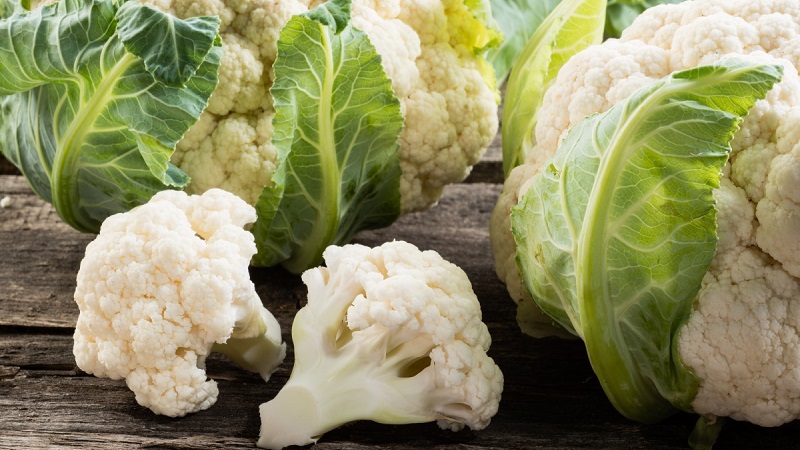
When breastfeedingany new product is introduced in the morning or at lunchtime. The first intake is no more than 100 g, if there are no negative reactions, the daily intake is increased to 250 g per day.
After a month, mashed potatoes or stewed vegetables can be eaten in the evening, but there should be at least three hours before bedtime.
What to combine with
Combines cauliflower with:
- any other vegetables;
- meat: chicken breast, lean beef;
- cheese;
- cereals;
- with cream and butter.
It is undesirable to combine different types of cabbage with each other - for example, white cabbage and broccoli with cauliflower.
Can I give a child
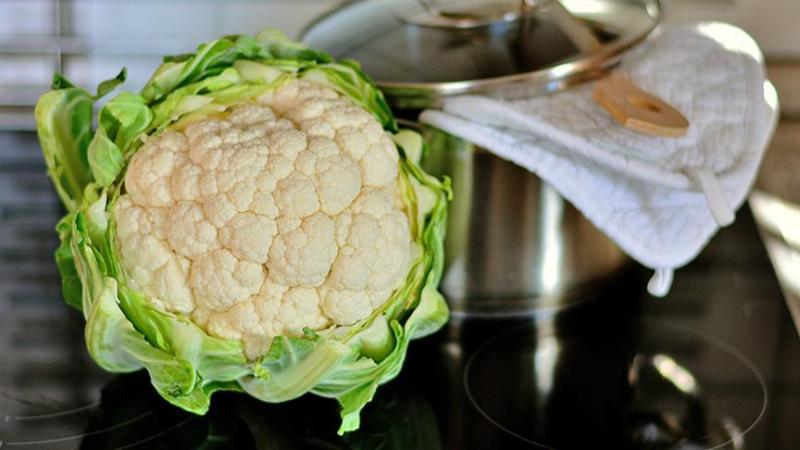
Cauliflower is recommended as the first complementary food, as it does not cause allergies, intestinal irritation and is rich in vitamins.
- Cabbage contains a lot of iron - it is traditionally included in the diet of children with low hemoglobin.
- Vegetable protein makes you feel full.
- Due to the presence of light fiber, metabolism improves.
- Bones are strengthened, the elasticity of blood vessels increases.
If the baby is breastfed, the vegetable is introduced into the diet from 6 months, if artificially - from 5 or even 4, on the recommendation of the pediatrician.
How to choose the right one
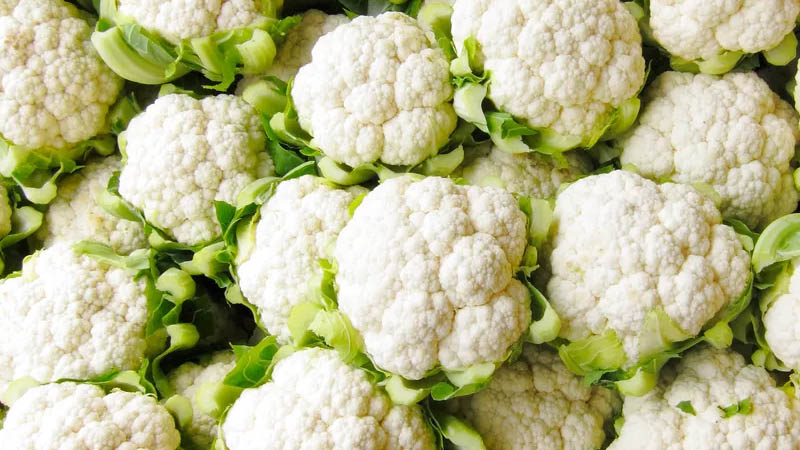
It is best to buy cabbage from a familiar farmer or trusted organic stores.
Basic rules for choosing:
- the head of cabbage should be white, without blackheads and rotten parts;
- leaves on a stump - a rich green color;
- the head of cabbage should not be loose;
- inflorescences are pressed against each other and without defects.
If there are doubts about the quality of a vegetable, it is better not to buy it or, in extreme cases, boil it in two waters, the first must be drained.
Cauliflower Recipes for Nursing Mothers
Boiled cauliflower is a great snack or salad ingredient for a young mom. The vegetable is also used as a side dish, seasoned with butter, or as part of a vegetable soup. For puree soup, you can take frozen cauliflower - almost all vitamins are stored in it, and in winter it is more accessible and cheaper than fresh.
It is easy to make chicken vegetable stew as a main course. For him you will need:
- inflorescences of one cauliflower;
- 2 large sweet carrots;
- 2-3 potatoes;
- chicken breast weighing 150-200 g;
- greenery.
Peeled and diced potatoes and carrots are mixed with minced meat, poured with cold water, stewed for 25 minutes. Then cabbage inflorescences are added to the boiling stew, salted. Simmer the dish under the lid for about 10 minutes, after turning off the heat, add chopped greens.
Serve stew with cream or cold-pressed vegetable oil.
For breakfast you can to cook omelet with cauliflower and herbs. Small cabbage inflorescences are mixed with a beaten egg, butter and herbs, placed in an ovenproof dish and baked in the oven for 15-20 minutes.
Important! It is best to avoid fried foods with cauliflower during breastfeeding. They can cause intestinal upset and liver problems in the infant.
Conclusion
Cauliflower during breastfeeding is not only possible, but also recommended to be included in the diet - it is rich in trace elements, vitamins, vegetable protein and practically does not contain coarse fiber. However, it is important to cook it correctly - to stew, boil or bake it, and choose high-quality vegetables grown without the use of growth stimulants and other chemicals.